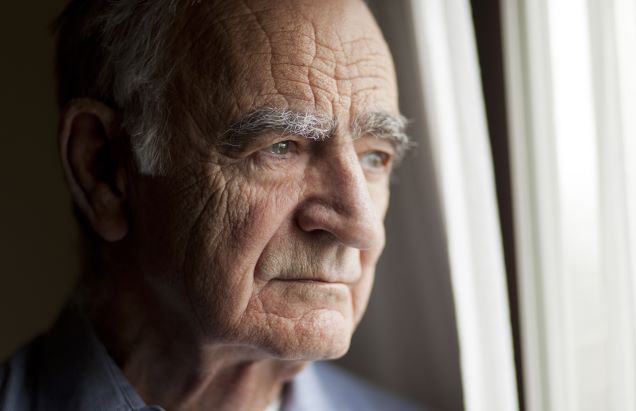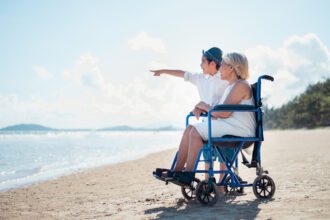Loneliness by Dr Rajna Ogrin
There are times when we may feel lonely, and this is especially true amongst older Australians and even more-so during a pandemic. Read more about research on Loneliness by Dr Rajna Ogrin here.
Original article by Dr Rajna Ogrin from the winter edition of ONECOTA Magazine.
Over the next couple of editions of ONECOTA we will be looking at what it is to be lonely and what impact it could be having on you. Our contributor is Dr Rajna Ogrin who is a long time COTA member and is a Senior Research Fellow at Bolton Clarke. Rajna led an article that was published in an edition of the Australasian Journal on Ageing 2021 called ‘Loneliness in older age: What is it, why is it happening and what should we do about it?’
As always, we would like to hear from you our readers, and welcome your feedback so you can be part of the conversation.
From time to time many of us feel lonely and if we have long periods of loneliness or become socially isolated it can impact negatively on our physical and emotional health and wellbeing. This is especially true amongst older Australians and even more-so during a pandemic.
What prompted your interest in writing about loneliness?
My interest in the area started back in 2015. We read a great report commissioned by Lord Mayors Charitable Foundation on the lack of supports for older women to stay independent, particularly women living alone. We were awarded funding to codesign programs to support older women living alone to maintain their independence.
The project findings were that while practical supports were important, they needed a social component to be truly supported. We were able to progress this research activities older women living by themselves had created. This focussed on social connection as well as activities older women living by themselves said they needed to help them stay independent.
Around that time, there was increasing information being raised by groups like Relationships Australia and Ending Loneliness Together about how loneliness was a real health issue.
We wanted to support their work in raising awareness of loneliness, as well as the need for community-wide approaches to truly make inroads into supporting people to connect with others in their community and thereby stay as well as they can.
What is loneliness?
Loneliness is a mismatch between a person’s actual social connections and their desired relationships with others that is experienced as negative, uncomfortable, and emotionally distressing.1
Social isolation is about the quantity of social connections within a person’s social network, while loneliness is about the quality of a person’s social connections.2, 3
It is important to note that feeling lonely for short periods of time is normal. It is when those feelings continue into the long-term and become chronic, that it can be problematic.
Why is it happening and is there evidence that it is on the rise?
There are many factors that can contribute to loneliness, involving individual, relationship, community and societal factors. Life transitions or changes in later life can increase the risk of loneliness as they can negatively impact on each of these factors.
While everybody experiences transitions during their lives they tend to increase and have a greater impact as we get older. Transitions can be expected, for example retiring or becoming a grandparent, or unexpected such as reduced physical or cognitive ability due to illness, or an accident. All these changes can affect how people see themselves, their relationships and their sense of belonging.
Recent results from a representative sample of older Australians (≥65 years) indicate that 46% reported feeling that they lacked companionship at least sometimes.⁴ Another Australian study found 32% of older people reported feeling lonely sometimes, and 9% reported feeling lonely often or always.⁵ Many people are uncomfortable talking about feeling lonely, so it was an area that didn’t get much attention.⁶ Although, the true number who experience loneliness among older adults is likely to be higher.
As information about loneliness isn’t something that had been collected before, and these numbers are likely not accurate, we are not sure if more older people are feeling lonelier than previously.
In later life loneliness may affect us as individuals and in our relationships, what are your thoughts about this?
Yes, as we get older there are many changes in our lives that impact us as individuals, our relationships, with our communities and in our broader society. An example at the individual level is where, due to arthritis, we might not be able to go out and do activities with friends that we used to do, limiting contact with others. If there are few other activities that enable you to link with others, this may make a big impact on your connection with others.
With older age, changes in relationships, such as separation or loss of a partner or other close family or friends will increase their likelihood of living alone, and generally having fewer close personal relationships.
Both of these may lead to feelings of loneliness.
How has COVID-19 impacted on our levels of loneliness?
COVID-19 restrictions had reduced social interactions, which limited people forming new social relationships and keeping their relationships going, so loneliness did increase at that time. Now that restrictions have eased, loneliness has reduced.⁷ However, one in two Australians reported feeling lonelier since the onset of the COVID-19 pandemic.⁶
What should we do about it? Strategies?
Why someone is lonely is different for everyone, so it’s important to find out about their circumstances. As loneliness is a complex issue, an approach that includes individual-, group- and societal-level interventions is needed. This will support healthy ageing in general. In general, the research shows that meaningful social networks and the ability to sustain positive personal and social relationships are protective factors against loneliness. So strategies that support engagement in activities that give older people a sense of purpose and a life of meaning will likely be most effective.
‘It is apparent that there is no one-size-fits-all solution.’
You can read the full published article on loneliness in older age online: onlinelibrary.wiley.com/doi/10.1111/ajag.12929
REFERENCES
- Ogrin, R., Dickins, M., Johnstone, G., Mortimer, D., Iezzi, A., & Lowthian, J. (2020). Co-creation of services to maintain independence and optimise well-being: Learnings from Australia’s Older Women Living Alone (OWLA) project. Health & Social Care in the Community, 28(2), 494-504. doi:10.1111/hsc.12882
- Peplau LA, Perlman D. Perspective on loneliness. In: Peplau LA, Perlman D, eds. Loneliness: A sourcebook of current theory, research and therapy New York: John Wiley and Sons; 1982:1-18.
- Lim MH. Australian Loneliness Report: A survey exploring the loneliness levels of Australians and the impact on their health and wellbeing. 2018; psychweek.org.au/wp/wp-content/uploads/2018/11/Psychology-Week-2018-Australian-Loneliness-Report.pdf.
- Lim M. (2018). Australian Loneliness Report: A survey exploring the loneliness levels of Australians and the impact on their health and wellbeing. Australian Psychological Society; Swinburne University. www.psychweek.org.au/wp/wp-content/uploads/2018/11/ Psychology-Week-2018-Australian-Loneliness-Report.pdf
- Victor CR, Sullivan M, Woodbridge R, Thomas M. Dancing with loneliness in later life: a pilot study mapping seasonal variations. Open Psychol J. 2015;8(1):97-104
- Ending Loneliness Together (2020). Ending Loneliness Together in Australia: White Paper. Ending-Loneliness-Together-in-Australia_Nov20.pdf (endingloneliness.com.au)
- Lim MH, Qualter P, Thurston L, Eres R, Hennessey A, Holt-Lunstad J, Lambert GW. A Global Longitudinal Study Examining Social Restrictions Severity on Loneliness, Social Anxiety, and Depression. Front Psychiatry. 2022 Mar 28;13:818030. doi: 10.3389/fpsyt.2022.818030. PMID: 35418888; PMCID: PMC8995965.











